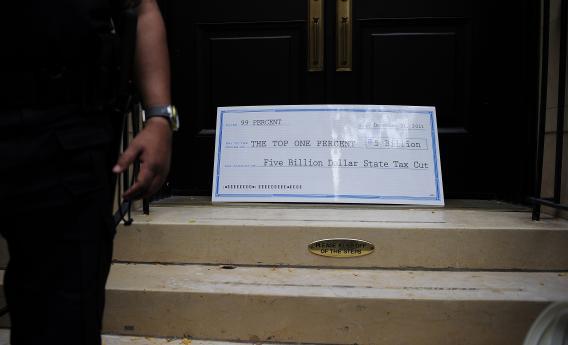For bankers, the cash is greener on the other side of Wall Street. The top 40 hedge fund managers took home $13.2 billion between them for 2011, Forbes estimates. Yet even industry godfathers like Ray Dalio of Bridgewater Associates manage to attract far less opprobrium than bank bosses, whose paychecks are considerably smaller.
Dalio made $3 billion for last year, Forbes reckons. By contrast JPMorgan Chief Executive Jamie Dimon, for example, looks set to do no better than the $23 million he pocketed for 2010. The comparison isn’t clean. Hedgie figures typically include gains on their holdings in the funds they manage, whereas for bankers and other corporate executives, it’s usually just annual pay being quoted.
Even so, top hedge fund managers pull in far more than the top earners in banking. Yet an unscientific test suggests they also escape the public’s anti-wealth wrath. A check of the Factiva news archive shows big-name hedgies generate only a fraction of the publicity associated with words like “pay” and “bonus.” With the gap between haves and have-nots high on the U.S. election agenda, it’s worth understanding the discrepancy.
One explanation is that hedge fund titans are for the most part also entrepreneurs who built their firms from scratch. Also, they provide a product that, in good years, pleases investor clients. Dalio’s flagship fund just overtook retired George Soros’ Quantum Fund as number one in total dollar terms for investor returns over the years, at $35.8 billion, according to estimates from LCH Investments.
Most hedge funds stay private, too, echoing the closely held bank partnerships of years past and largely defying the trend of fellow alternative asset managers like Blackstone going public. And when it comes to pay, despite the high fees, hedge fund bosses get a lot richer only when their investors do.
Read more at Reuters Breakingviews.
For bankers deploying other people’s money, that linkage is far less clear. Banks’ shareholders accept a smaller cut of the spoils, and lately some of those “other people” are taxpayers who have provided a financial lifeline. The message seems pretty clear for frustrated Wall Streeters: Build a business, stay private and invest prudently enough to avoid the need for a bailout.
